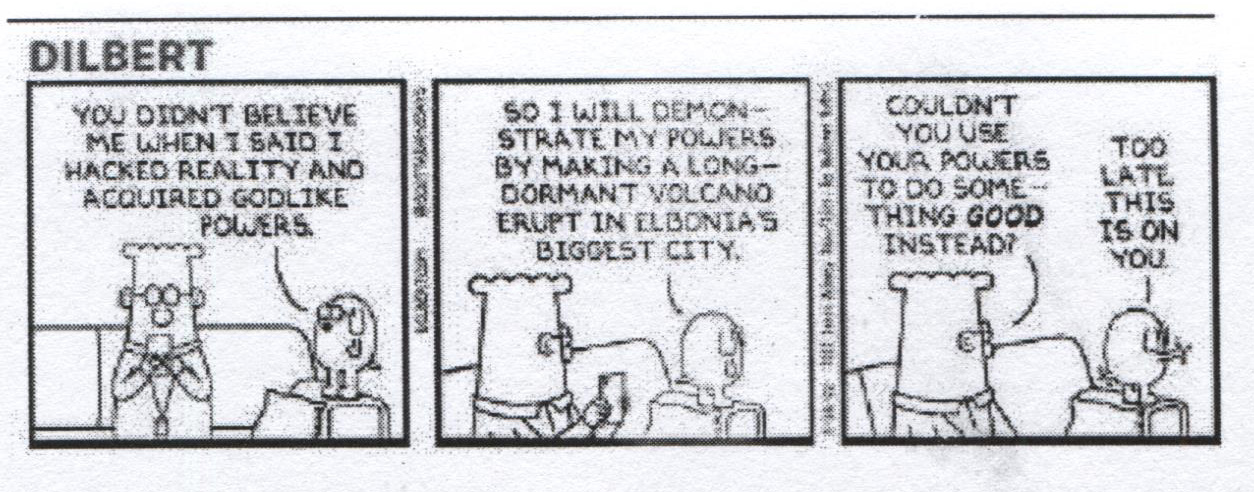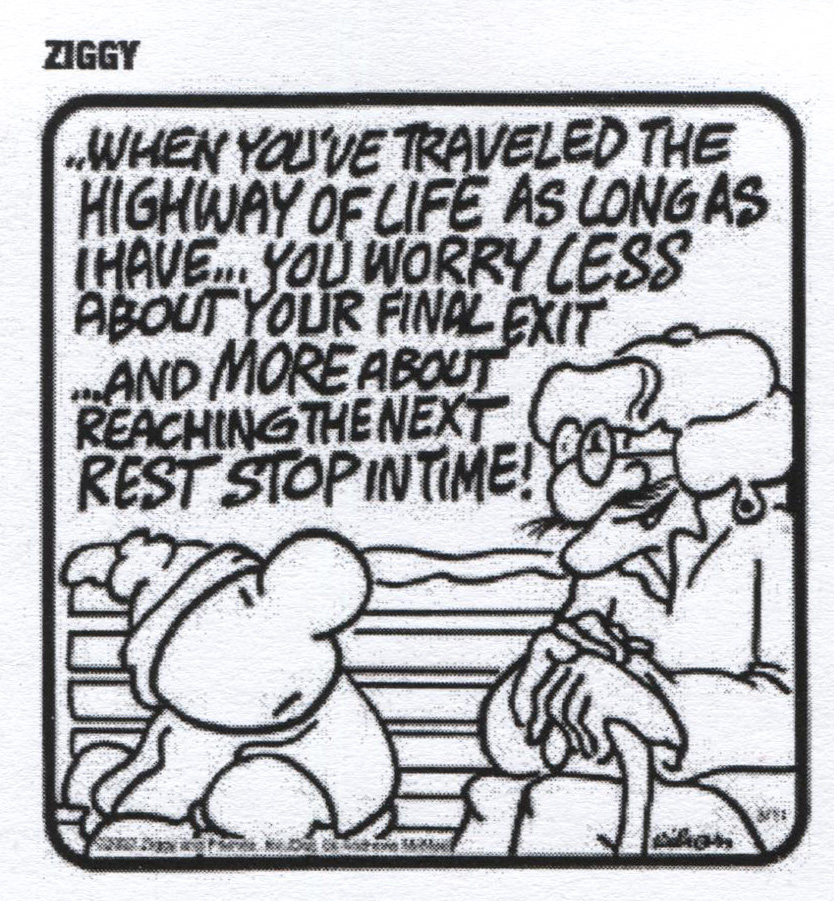Post your thoughts, questions etc. on James's philosophy and its implications for both those who do and do not believe in a god. Don't forget to declare your
topic.
1. The philosophy which is so important in each of us is not a technical matter, says James, it is our what? In those terms, and to the extent that you can find
2. The history of philosophy is that of a clash of what? Do you agree that philosophers' reasons do not initially indicate and identify their respective philosophies? What would you say is the originating source of yours?
3. What quarrel do the the pragmatists have with the definition of truth as agreement? Do you consider the classic correspondence theory of truth helpful or constructive in the practical matter of discovering truths?
4. What is pragmatism's usual question? Are you in the habit of posing this question, with regard to your own as well as others' philosophical assertions?
5. "Woe to him whose beliefs play fast and loose with" what? Does this statement reassure you that pragmatism is NOT an arbitrary philosophical relativism?
6. "To 'agree' in the widest sense with a reality" means what?
7. "We live forwards, _____ has said, but we understand backwards." If that's right, what would you consider the pragmatic lesson we should learn about the nature and function of truth in human affairs?
WJ,
Pragmatism Lec VII
Pragmatism and Humanism; Lec VIII
Pragmatism and Religion. Post your thoughts, questions etc. on James's philosophy and its implications for both those who do and do not believe in a god. Don't forget to declare your
midterm report presentation topic.
1. What attitude towards science, art, morals, and religion does WJ call an idol of rationalism? Do you share it?
2. Whose version of Humanism holds truths to be human products "to an unascertainable extent," and the world to be "plastic" to that extent? How is this a "butt-end-foremost" pronouncement? Do you accept it?
3. Tough-mindedness positively rejects what, and pragmatism cannot on principle reject what? Do you think this implies that pragmatists should resist the "tough-minded" label?
4. What's the "use" of the
Absolute? Do you find it a useful and meaningful concept in philosophy?
5. "To You" by _____ is addressed to whom? What are two ways of taking it? Do you take it in one of those ways? What does your way say about your philosophical temper?
6. What does WJ consider "the great religious difference" between rationalists and empiricists, with respect to the world's possibilities and destiny?
7. What "type of theism" does WJ say avoids both "crude naturalism" and "transcendental absolutism"?
8. What are the three parts of reality we must take account of, in order to encounter truths? Do you think that's all there is to it? Is that enough, philosophically speaking?
9. What is the "essential contrast" between rationalism and pragmatism? Is it fundamentally an epistemological difference? What temperamental difference does it indicate, with what nod to Diogenes?
10. WJ's pragmatism is offered as a ____ between tough- and tender-minded philosophies.
The varieties of experience. WJ, Varieties of Religious Experience Preface, Lectures I-II (and whatever else you'd care to read) ; Carl Sagan, Varieties of Scientific Experience, editor's intro & whatever else you'd care to read. (You'll want to get hold of the book when you can, it features stunning astronomical photos missing from the excerpt below.) Also recommended: Pale Blue Dot, PBD text, PBD video, Who Speaks For Earth video, Cosmos, Cosmic Connection...and Carl's & Ann's daughter Sasha's For Small Creatures Such as We: Rituals for Finding Meaning in Our Unlikely World*
1. What was to have been the second part of these lectures, ultimately postponed (but "suggested" in the postscript)?
2. What precedent does WJ hope his lectures will set?
3. What result does WJ say is "alien to my intention"?
4. What "method of discrediting states of mind for which we have an antipathy" does WJ say we're all familiar with, which he calls medical ___?
5. Does WJ think religious emotions are more "organically conditioned" than scientific theories? Why does he think we find some states of mind superior to others?
6. What's WJ's definition of religion? And what do you think of it?
7. "At bottom the whole concern of both morality and religion is ___."
8. "We are in the end absolutely dependent on ___."
9. What did Carl Sagan find tragic about the Genesis creation story, and why did he find Darwinian science more spiritually satisfying? Do you?
10. Carl agreed with Bertrand Russell that what we need is ___. (Russell was targeting WJ with this barb, but do you Carl and WJ ultimately disagreed about this?)
11. Carl wanted us to see ourselves "not as the failed clay of a disappointed Creator but as ___."
12. What did Carl admire about WJ's definition of religion? Do you think science, religion, philosophy are in some important sense an attempt to come home? Or to have the experience of feeling at home, in our experience and our lives?
RR foreword, preface, 1
1. The ultimate goal and aim of pragmatism is what, according to Rorty?
2. How is Rorty at one with Kant?
3. Rorty says for James and Dewey the only goal was what?
4. What does Rorty want to teach us, according to Robert Brandom? And who do you think he means by "us"? Do you think WJ wanted to teach us the same thing?
5. What are norms, for Rorty, and how do they relate to reality (and Reality)? Do you understand and accept Rorty's upper/lower case distinction?
6. What of the original Enlightenment did Rorty applaud? Do you?
7. What in Plato and Christianity does Rorty call morally ambiguous?
8. What does Rorty say Dewey and Nietzsche simultaneously turned their backs on, and why? But what difference sharply distinguishes them?
9. What does Rorty say his version of pragmatism mediates and replaces?
10. Dewey, like James, hoped each new generation would try to do what? Is that a worthy and reasonable hope? What did Peirce, James, and Dewey "combine"? What was James more interested in than either of the other two?
11. James approvingly cited Papini's description of what, in making what point?
12. What did Dewey say was the proper task of future philosophy?
13. What do his biographers agree was central to the formation of Dewey's mature thought? To what need related to his father does Rorty think we owe the pragmatist theory of truth? What is that theory's underlying motive?
14. Dewey's stories are always stories of what kind of progress?
15. James rejects what Clifford-like view?
Polytheism, Universality and Truth. RR 2-4
1. Berthelot found an affinity between James and who? And traced the bifurcated roots of pragmatism to who?
2. Abrams says poetry can be a substitute for what? What definition "covers" Nietzsche and James?
3. Echoing Mill, James said what about demands and desires? Agree?
4. Nietzsche mistakenly thought what, about happiness? Do you agree that he was mistaken? How do James and Dewey differ from Nietzsche with regard to religious belief generally?
5. What text of James or Dewey does Rorty think "coheres best" with their shared view? What do you think of WJ's statement about "the end of religion"? (36)
6. In a democratic society everybody gets to worship what? What was "Dewey's god"?
7. In what way does Rorty see Clifford as religious?
8. RR thinks the universal desire for truth (or unconditionality) is better described as what? Why is the yearning for unconditionality unhealthy?
9. What makes us special, for Dewey? Why might that sound suspicious to Habermas and Apel?
10. What project "is democratic politics?
11. What do "we American college teachers do" when encountering religious fundamentalists?
Pan-Relationalism, Depth. RR 5-6 [I realize now, btw, that I was ahead of myself this afternoon when I said we were officially reading these lectures today.]
1. Rorty says "we bourgeois liberal have Dewey" and no longer need who to fend off anti-Enlightenment irrationalism? Agree? How would you characterize the difference between their respective conceptions of enlightened philosophizing?
2. How should we not answer "what purpose is this description supposed to serve"?
3. Why are numbers a good model of the universe?
4. What do pragmatists think is the aim of inquiry? Do you think their aim is true? (Elvis Costello pun only partly intended.)
5. What's pointless about things-in-themselves?
6. What did Darwin make hard for essentialists and Kantians?
7. Why must pan-relationalists (& pragmatists) not accept the making/finding distinction their critics would like to impose on them?
8. Socrates/Plato said knowledge of something deep would let us escape from what?
9. In what sense, for a pragmatist, are philosophy's traditional problems verbal?
Ethics, obligations, justice. RR 7-8. PRESENTATION: Gary, "My Two Weeks With the Atheists of Prague"
1. What practical question do pragmatists prefer to what traditional question?
2. What may be "the best single mark of our progress toward a full-fledged human rights culture"?
3. RR asks if we could replace "justice" with what?
4. The problematic dichotomy of reason vs. feeling would begin to fade away, says RR, if we thought of reason as what?
Empiricism. RR 9-10, epilogue. PRESENTATION: Javan, Pragmatism as humanism
1. What statement of Wittgenstein's does RR think applies to terms like "sentience" and "consciousness"?
2. What does RR say Brandom "flirts with"?
3. What cultural achievements do Anglophone and non-Anglophone philosophers first think of?
4. When RR says he sees nothing worth saving in empiricism, he means he doesn't want to save what as a non-human authority due our respect?
5. In the Epilogue RR is quoted as saying what about his faithfulness to the thoughts of James and Dewey?






